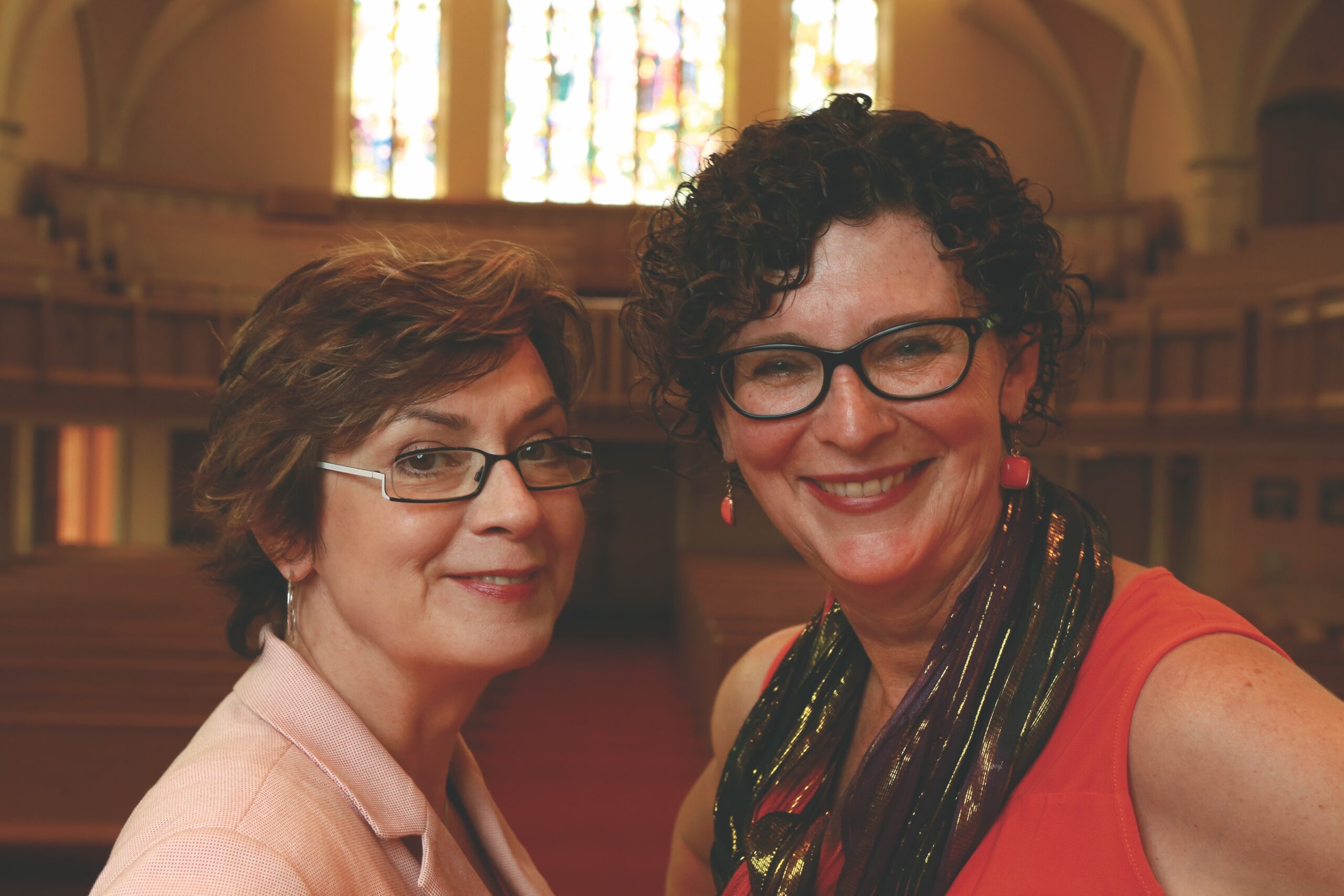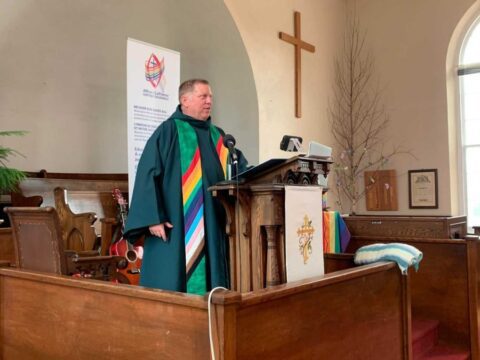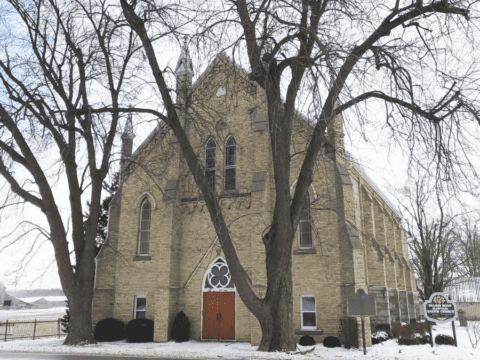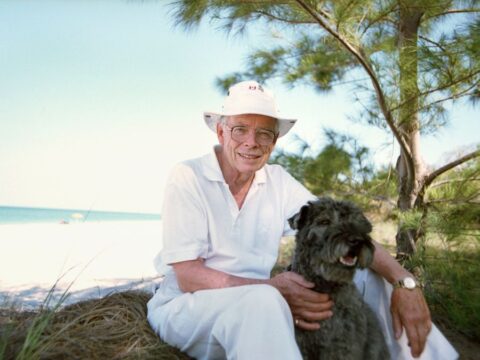Rev. Gretta Vosper, minister at West Hill United in Toronto, and Rev. Connie denBok, minister at Alderwood United in Toronto, sat down to chat with David Wilson, editor of The United Church Observer.
Observer: Can you briefly describe your personal perspectives on God and Jesus?
You may unsubscribe from any of our newsletters at any time.
denBok: First of all, we’re always talking in the context of God’s story. And God’s story is that the universe is not a vast empty vacuum with specks of dust scattered about it, but is filled with love. We were created from love, and Jesus is love in the flesh come to live among us.
Vosper: God is not necessary for living a life of love. I believe God is getting in the way of our ability to live a life of love well, in particular as a church. The stories of Jesus have been used through time to effect both positive and negative change within communities. I believe we need to bring our own moral discernment to those stories, so that they can be augmented by the stories of thousands of other people who, through the course of time, have also sought to bring about justice and compassion in the world.
Observer: Is there a place for doubt in Christianity?
denBok: Well, the question is loaded. Since the Enlightenment, the secularist story has implied that religious faith is essentially a matter of doctrine and belief, to which one intellectually assents. But in fact, the word “faith” in the Greek New Testament is an intransitive verb; you don’t have faith, as in a system of belief. For us, faith is a relationship, primarily with God, which flows into a relationship with other people through engagement in spiritual practices.
I think a faith system that does not permit harsh questioning, moments of self-doubt, is simply too fragile to continue.
Vosper: Doubt is the flip side of faith, and the two of them exist in an intense symbiotic relationship. I don’t think doubt is exclusively connected to doctrinal belief. The exploration of questions — related to the nature of reality, to our relationships, to being in community — includes the concept of doubt: “Am I doing this for the right reasons? Let me explore that a little bit.” But those kinds of reflections, that intense exploration, can take place outside any added understanding of the concept of God.
Observer: Gretta, why do people come to your church? What are they looking for?
Vosper: There are people who show up because they know what we do and expect to be supported in a world view that they have developed, usually on their own. There’s a group of people who want to see what it feels like. And then there are people who stumble in the door when their lives are in chaos and are looking for the support of a community.
The first group, they get into intense, rich conversations. The second group is a little more tentative. The third group, they often don’t even recognize that I’m not using the word “God,” and don’t notice that we’re not reading from the Bible. The community has created what we have called a non-exclusive, spiritual space — although the word “spiritual” is now grating on some people’s nerves.
Observer: Connie, your church is pretty healthy. Why are people coming to your place?
denBok: Mine was a 1950s suburban church that reached the end of its lifespan. Early on, I did 50 funerals in one year. Today it is a reforming church with the younger generation that’s moving into the subdivision.
In spite of the story-line that we have outgrown God and religious practice, I’m finding a generation hungry for God and for a spirituality that engages them in an encounter with the Other. The God story is very much focused on somebody who is not me, who is in relationship with me; someone whom I cannot remake according to my particular tastes; someone who has thoughts and opinions that are different than my own.
Observer: Is the United Church big enough and flexible enough to employ all sorts of ministers, even those who no longer accept what the church professes to believe?
denBok: If we had a clear doctrinal statement or a clear mission, or if we had a clear anything that we hold in common — other than the pension plan — it would be easier to answer that question. As it is now, we are, in my opinion, a kind of anarchistic loose alliance of individuals and congregations, held together by a common property owner, by a common love for nobody telling us exactly what we should do. We have that in common.
Vosper: Yes, that’s right. One of the things the United Church failed to do, as many other mainline denominations failed to do as they moved away from a salvationist theology, was to name why we come together. We got close to having those important conversations in the 1960s, but we veered away because we were afraid it was going to tear the fabric apart, and we didn’t want to deal with that.
denBok: Ours is a branch of the church family that seems to have lost its purpose and sense of direction. Our family tree looks like it will become extinct unless we find a way to connect with God and the Christian scriptures.
Observer: You come from very different places theologically. Can each of you justly call yourself a United Church minister?
denBok: I have no problem calling myself a United Church minister. But, Gretta, can I ask you a question?
Vosper: Yes, go ahead.
denBok: Okay, a respectful question. Do you refer to yourself as an atheist?
Vosper: I’ve been called an atheist for a very long time, and I have to accept the label. There are people in the congregation who are disturbed by this, but the understanding of an atheist as someone who does not believe in a theistic God is pretty easy.
Yet I extend it to positing a supernatural realm in the universe. If you went with that definition across the board, a lot of people coming out of theological colleges and in pulpits in the United Church and Anglican Church and Catholic Church would also have to accept the label.
I would say that my deeply held beliefs and values have not transitioned me beyond what I believe the United Church is and the United Church I was raised in. I was a product of the New Curriculum. I never had an authoritative, judgmental God who overlooked everything I did. Jesus taught me to skate in my backyard. I had a relationship with him as a friend — that was how it came out in the curriculum.
denBok: I never had an authoritative, judgmental God either. When I read your books, I am struck by the realization that I don’t believe in the same God you don’t believe in.
Vosper: I know, but the reality is, that God is very strong and a very pervasive influence in politics and in a variety of things around the world, so we still need to address that God.
denBok: We do, but we address it by retelling the story. I think God is a major agent in that story, but not in an interventionist kind of way. What we need to do, beginning with our theological training, is teach people transformational spiritual practices and allow them to understand God in a different way than in Sunday school.
Vosper: We are now at the point where there’s no need for any kind of a chasm between the pulpit and the pew. Information is available in the pew in a way it has never been before. But I don’t think that reclaiming the language and explaining it all as metaphor is sufficient, because it just digs a moat around the church.
Living in right relationship with others, with the planet — that is what I have seen and distilled as the essence of the work of The United Church of Canada, and I’m very much engaged in that work.
denBok: Of course. But you don’t need church for any of that. The only thing church has to offer that other organizations don’t do better is the God thing.
Vosper: So let other denominations do it, and let The United Church of Canada — which is the only denomination on the planet that might ever actually say in its documents that the Bible is not the authoritative word of God for all time — move forward into discourse with others.
Observer: But Gretta, do you think that’s even remotely possible?
Vosper: No. We’re two, three generations too late. We should have kept with this work in the 1960s.
denBok: Or honourably split, way back when.
Vosper: Honourably split, way back when. Exactly.
Observer: Do ministers who no longer believe, or no longer believe what they used to believe, have an obligation to come clean to their congregations?
Vosper: No. The United Church of Canada has an obligation to support clergy who no longer believe so that they have safe passage. In my case it was a process, and I was with a congregation that had already done a lot of exploration. But for someone just to do it with no protection, no support . . .
Observer: But isn’t a minister without faith a bit like a hockey player who decides in the middle of the game that he’d rather be playing baseball?
Vosper: No, because the game has morphed into baseball.
denBok: No, I don’t think that it has. I know lots of ministers at the other end of the spectrum, who are very Christ-focused and also focused on social justice, who live in fear of some bully from Presbytery or a search committee declaring them a fundamentalist and excluding them from the main life of the church.
Vosper: Which is exactly what the people I support fear, because they’re ridiculed by their peers at theological college.
denBok: The all-inclusive church is mythology, and we know that we have both suffered under it. For some obscure reason, we’re both where we are. We aren’t bullied easily, I suppose.
Observer: So, back to the question.
denBok: I think that if any denomination has a future, it’s going to need to focus on who it is, what it believes. Any healthy organization, once it draws its boundaries, knows that there are some people who are clearly with the mission and some people who are clearly not.
Vosper: But define the mission, Connie. What is the mission?
denBok: The thing is, in the United Church we can’t do that.
Vosper: But we can. I think we can. We were born in the social gospel movement, we’ve been on the forefront of justice issues and community building for our entire —
denBok: No, that’s revisionist history. In 1925, we were born as a movement to do evangelism, to plant churches across the Prairies so that Presbyterians and Methodists weren’t competing with each other. The centrefold for the first Observer was “Canada for Christ.”
Vosper: [The United Church] also had the social activist element, and when we look back at our history, those are the moments when we have stood proud and strong, not our evangelism moments.
denBok: With all due respect, one could say the opposite too. But what we are each describing is a church that we are both a part of. It’s like some dysfunctional extended family; you can’t divorce family members.
Observer: Connie, if a movement suddenly sprung up to — for lack of a better word — kick Gretta out, would you come to her defence?
denBok: I would certainly not support the movement, because once we start drawing the lines based on personality without clear definitions, it’s like the French Revolution — we just start chopping off heads.
Vosper: But that wouldn’t be based on personality. It would be based on doctrinal belief.
denBok: I would reach out on a personal basis, but on a doctrinal defence basis — I don’t think I could.
Observer: Gretta, say Connie gets into trouble because maybe she’s a little more doctrinal than Presbytery wants her to be. Do you defend her right to believe what she believes and how she believes it?
Vosper: I think I already do that. However, if Connie were to use her doctrinal beliefs to refuse rights to whole segments of society, to deny them access to things, then I’d get in her way. But I don’t think that’s where she’d be.
denBok: No, we could work together on many things.
Observer: Is the question of doubt and doctrine going to be a major conversation generally in The United Church of Canada?
denBok: What’s happening, I think, is that like-minded people are forming informal clusters within the church. And so in a sense, the people with whom I have theological discussions and debates, the people I would hang out with voluntarily on a Saturday morning, are people who are coming to a similar place to where I am. Or at least to a broad enough place, in a theistic kind of way, that we can pray together and discuss things from the same world view.
I’m still having fun in ministry. I know a lot of my colleagues are. I have a huge hope for the future, but my hope is based on the premise that I’m living the story in which love wins in the end. I can have courage to go forward, knowing that I may not succeed today, but eventually the world wins; God wins. It’s a good ending.
Observer: How does it end for you, Gretta?
Vosper: Last Sunday, I spoke in a congregation in Halifax. The songs that we sang were traditional tunes with words that have been rewritten. Many people wept; this often happens. You have men with tears streaming down their faces because they are given back music they haven’t been able to sing. I feel like I am part of a process of re-embracing, that love will out. But love will out, with or without God.
If you’re doing ministry from a place of integrity that includes and embraces a god, however you want to define it, then we’re working together. I’m working with people who cannot do it with the language of God or the privilege given to a set of historical texts, or an individual who is featured in those texts. I think that we both walk with the same hope. We just do it with very different groups of people, and with very different world views.
This dialogue has been condensed and edited.
***
This story first appeared in The United Church Observer’s November 2013 issue with the title “Beyond belief.”













